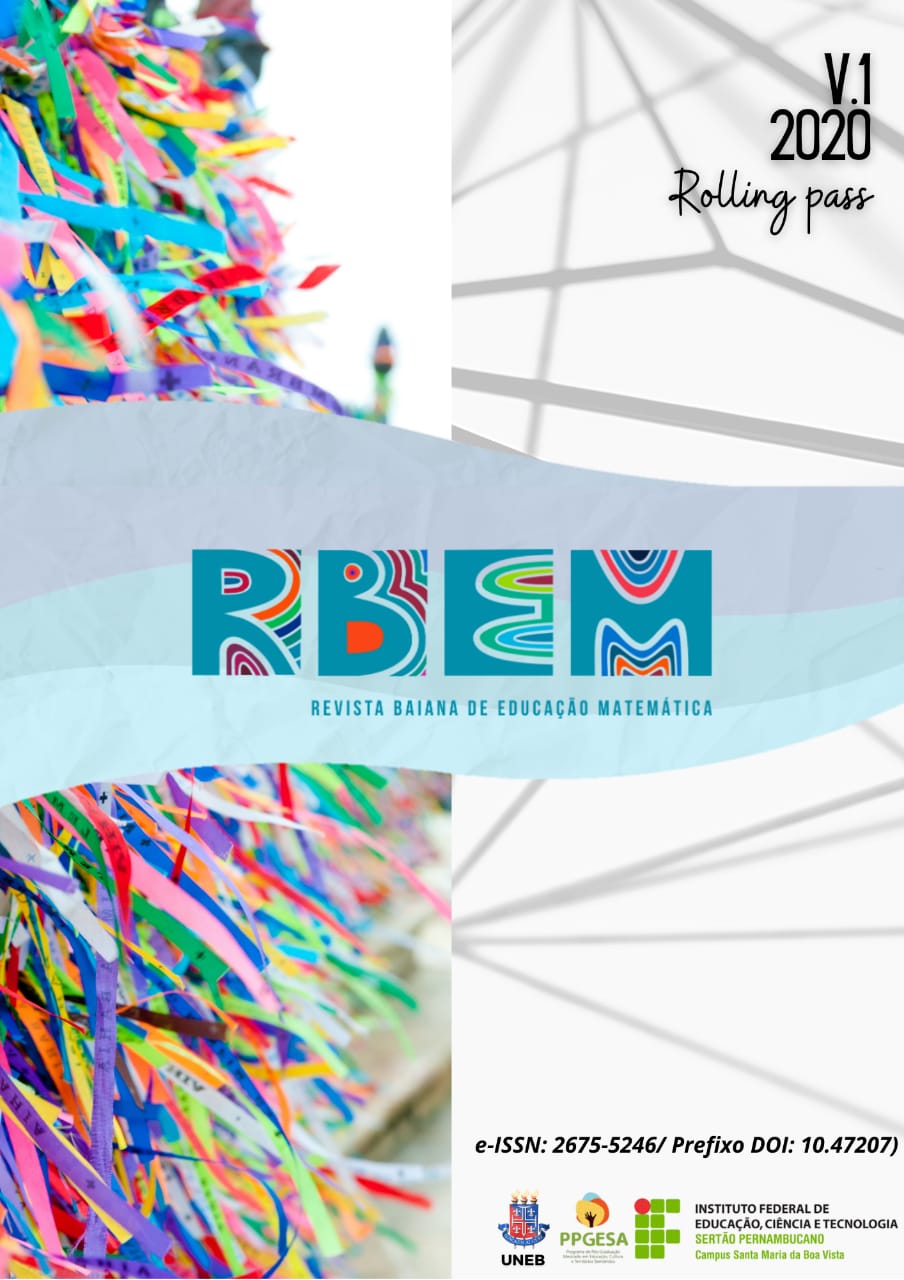TRIGONOMETRY IN RURAL SPACE: implications of contextualized mathematics education
Conteúdo do artigo principal
Resumo
This text aims to understand how the experiences with pedagogical workshops on taching mathematics in rural areas favored the teaching and learning of geometry by undergraduate in Pedagogy and by elementary school students. The text reflects the contexts of the countryside, showing how this can be enhanced as a locus for valuing actions in teaching that go beyond the school walls and expand by the contexts of life of their students. The methodology of this work comprises the realization of a pedagogical workshop with a course load of 12 hours, held at Sítio Mata da Lua by graduates of the Pedagogy Course in the Teaching of Mathematics discipline, given to students of the 9th grade of Elementary School II and the High school. The workshop was the research device used to enable reflections on the development of teaching practices that aim to theorize and value the students' context through a study on the concepts of trigonometry, plane geometry and surface measurements in situations and experiences in the fields. We take the reports of teachers and students who participated in this workshop as an element of analysis. It is concluded that the teaching of mathematics generates meanings for the student when the context in which he lives is taken into consideration for the construction of school knowledge. The countryside was understood as a locus of teaching in mathematics, enabling students to create connections between th knowledge of the countryside and the knowledge of trigonometry, in a construction of significant learning about mathematical knowledge.
Keywords: Mathematics teaching. Initial formation. Contextualized education. Teaching in the country.
Downloads
Detalhes do artigo
Uma nova publicação de artigo anteriormente publicado na Revista Baiana de Educação Matemática, fica sujeita à expressa menção da precedência de sua publicação neste periódico, seguindo as normas de referência. Autores que publicam na RBEM concordam com os seguintes termos:
-
O Conselho Editorial se reserva ao direito de efetuar, nos originais, alterações de ordem normativa, sintática, ortográfica e bibliográfica com vistas a manter o padrão culto da língua, respeitando, porém, o estilo dos autores. As provas finais poderão ou não ser enviadas aos autores.
-
Autores mantém os direitos autorais e concedem à revista o direito de primeira publicação, com o trabalho simultaneamente licenciado sob a Licença Creative Commons Attribution (CC BY-NC-SA).
-
Autores têm autorização para assumir contratos adicionais separadamente, para distribuição não-exclusiva da versão do trabalho publicada nesta revista, exemplo: publicar em repositório institucional ou como capítulo de livro, com reconhecimento de autoria e publicação inicial na RBEM.
-
Autores têm permissão e são estimulados a publicar e distribuir seu trabalho online — em repositórios institucionais, página pessoal, rede social ou demais sites de divulgação científica.
Referências
ALVES, Nilda e GARCIA, Regina Leite (org.) et al. A Invenção da escola a cada dia. Rio de Janeiro, DP&A, 2000.
ALVES, Nilda. Tecer conhecimento em rede. In: ALVES, Nilda; GARCIA, Regina L. O Sentido da escola. Rio de Janeiro: DP&A, 2003, p. 91-100.
ALVES, Rafael Santana; CAVALCANTE, Kellison Lima. Educação contextualizada no ensino de matemática em uma escola no Semiárido de Juazeiro-BA. Revista Semiárido De Visu, v.5, n.1, p. 52-59, Juazeiro-Ba. 2017.
AUSUBEL, David P. A aprendizagem significativa: a teoria de David Ausubel. São Paulo: Moraes, 1982
BRASIL. Pró-letramento. Matemática. Disponível em: <http://portal.mec.gov.br/arquivos/pdf/fasciculo_mat.pdf>. Acesso em: 11 de agos. 2014.
CERTEAU, M. de. A invenção do cotidiano: 1, Artes de fazer. Petrópolis: Vozes, 1994.
GOMES, Antenor, R. e SILVA, Núbia. Imagem e conhecimento: Sentidos moventes, emergências e aprendizagem. Revista de Estudos Universitários, V.39 n.02. Brasil 2013. Disponível em: <http://periodicos.uniso.br/ojs/index.php?journal=reu&page=issue&op=view&path%5B0%5D=150&path%5B1%5D=showToc>. Acesso em: 09 de jun. 2014.
HELLER, Agnes. Sociología de la vida cotidiana. Barcelona: Península, 1977.
MORETTO, Vasco Pedro. Prova: um momento privilegiado de estudo, não um acerto de contas. 5 ed. Rio de Janeiro: Dp & A, 2007.
RIOS, Jane Adriana Vasconcelos Pacheco. Ser ou não ser da roça, eis a questão! Identidades e discursos na escola. Salvador: EDUFBA, 2011.
TUFANO, W. Contextualização. ln: FAZENDA, I. C. Dicionário em Construção: Interdisciplinaridade. São Paulo: Cortez, 2001.
VÁRZEA DO POÇO (BA). Decreto-lei nº 09, de 19 de junho de 2015. Plano Municipal de Educação. Arquivo da SME/Várzea do Poço-Ba. 2015.

